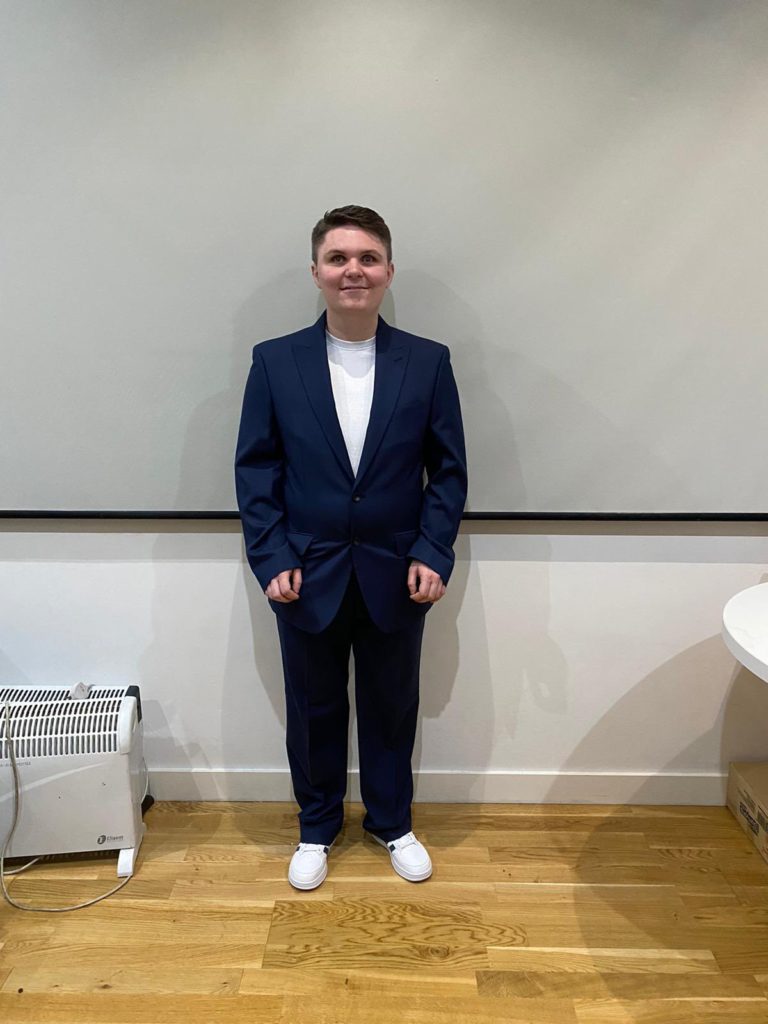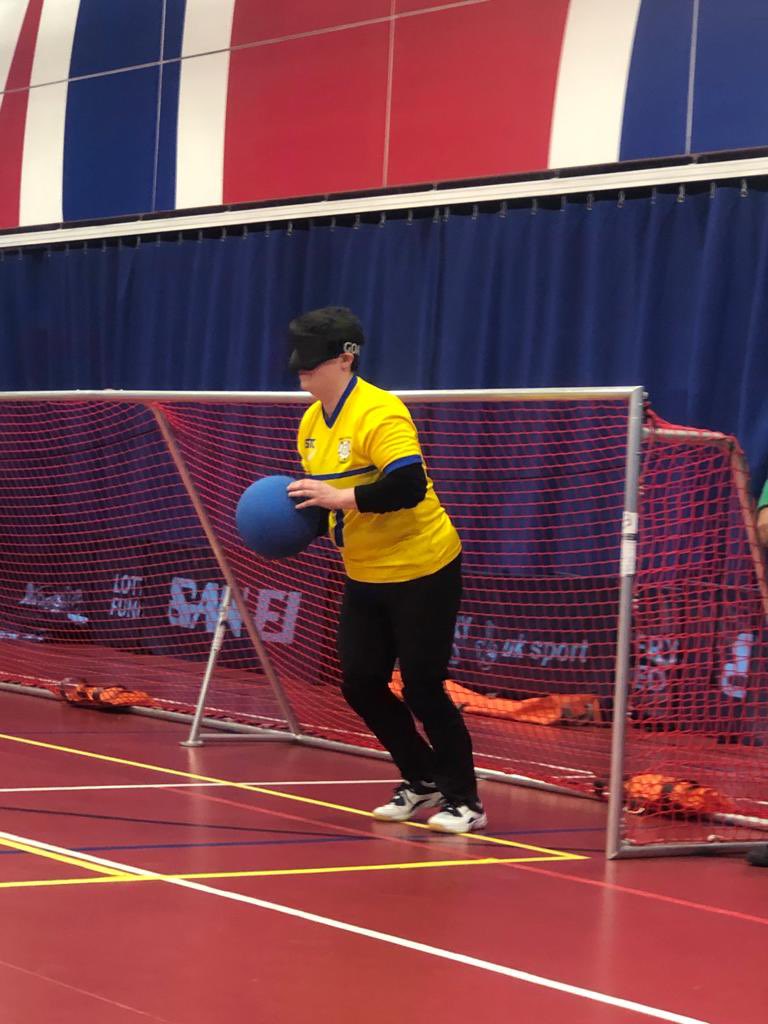Coming out as transgender has been shaped by my blindness
Connor is a transgender blind man from Leeds. To mark Pride month, he’s written this blog explaining the unique challenges of being both disabled and transgender.
“There are too many Connors in hockey.”
I laughed as I listened to the words being read out by my screen reader. They were written in an online chat that I’d just joined after being accepted to write for a fan website for my favourite ice hockey team, the Colorado Avalanche.

It’s true that there are a surprising number of people called Connor who are involved in ice hockey in one way or another. Unlike most of those people, I had chosen my name. It hadn’t occurred to me at the time how it would fit so well.
I wasn’t born with this name. In fact, I only chose it last year. I was assigned female at birth, though I identify as male. I came out as transgender last August when I was 27, and my name was one of the first things that I was able to change about myself.
Being born female will always be an important aspect of who I am, as it has shaped the person I have become. It is as much a part of me as my blindness, which I was also born with. I am almost completely blind due to Lebers Congenital Amaurosis, a rare inherited eye condition. I have light perception, but I can’t see colours, shapes or any other detail. I’ve always been a braille reader and I identify very strongly as blind.
I couldn’t change things gradually
Coming out has been an incredible and challenging experience which has absolutely been shaped by my blindness.
Not long after coming out, I had a conversation with my sister and she said something that really stood out to me. She was talking about a trans friend of hers, and how their transition had seemed less surprising in some ways than my own, because they had eased into it, changing their hair and clothing before they came out. I had wanted to do these things, but I hadn’t been sure how I could.
When shopping, I need assistance, whether that’s from someone working in the shop or from a friend. I hadn’t felt like I could ask for help buying men’s clothes without explaining why I wanted them. Likewise, I couldn’t look at pictures of hairstyles online to choose one I liked. I had to work with the person cutting my hair, getting advice from them. That was much easier to do after I came out and I could tell people why I needed to make these changes.
You have to open yourself up to come out
I think these are issues that all blind people face, whether they are trans or not. But when you are transgender there’s an extra layer to it because you have to assess whether it’s safe to come out to someone. Asking for assistance as a disabled person requires you to allow yourself to be vulnerable. I don’t mean that in the sense that we are fragile. Vulnerability, and acknowledging it, is a sign of strength.
“Asking for assistance as a disabled person requires you to allow yourself to be vulnerable… When you are also opening yourself up as a trans person there is more risk.”
What I mean is that you have to open yourself up to others and take a risk, knowing that their willingness to help or not will shape your experience. When you are also opening yourself up as a trans person there is more risk. But if you find the right people who are willing to support you, the reward is so much greater.
I have found that support network. My friends have been amazing and are always happy to give me advice, whether that’s helping me find an outfit for an event, or ensuring they always use my pronouns even when strangers misgender me. I’m often spoken about, which is an experience many disabled people will be familiar with. It is not unusual to be out with a friend and for a stranger to ask: “What does she want?”
My friend will respond, “I don’t know, you’ll have to ask him.”
I want people to see me, in all senses. I want them to recognise that I am a blind person who can and will answer for myself. The fact that my friends are always ready to redirect people who think I shouldn’t is so important.
My club mates have been supportive but I still worry
I have also found community in sport. I play goalball (a paralympic sport designed to be played by blind athletes), I rock climb, and I have recently begun to learn to ice skate. All of these things have challenged me in different ways.

I came back to goalball after a ten-year break, and wondered if people would accept me now I was out as transgender. In goalball, everyone wears a blindfold while playing, and the ball has a bell in it so you can track it by listening. That makes it an incredible sport to play as a blind person, as you know that it is designed for you, rather than being a sport that is adapted and may or may not work for you. However, it does mean that you are in an environment with a lot of people you may know, or who know of you. Your blindness connects you and that is so important, but if you’re a trans person like myself you have to consider whether you’re ready for the whole community to know.
I came out several months after joining a rock-climbing club, and it was the support of many of the members that got me through those first few difficult weeks. And finally, I have just started to learn to skate, with the hope that one day I’ll play hockey. It’s not a sport known for a welcoming attitude towards LGBTQ people, certainly internationally. However, that is changing and I believe that many people want to make it more inclusive.
Everyone at the goalball club has been so kind and supportive. I feel safe getting changed with the other guys who have welcomed me from the start. I know that if anyone else were to say something, they would have my back. Not all trans people have this and I recognise that I am incredibly lucky.
“If I go to the men’s toilet or changing room, I am likely to be told that I’m in the wrong room by someone who assumes I’ve walked in there by accident because of my blindness.”
Changing rooms were one of the things I was most worried about, and they are still a source of worry. At goalball it isn’t so bad, because I go in with the other guys and they treat me as though I belong. But what if I am going to the gym, or just want to use the bathroom in public?
If I go to the men’s toilet or changing room, I am likely to be told that I’m in the wrong room by someone who assumes I’ve walked in there by accident because of my blindness. It is another way in which these two aspects of my identity intersect. In general, I stick to the accessible bathroom where chances of confrontation, no matter how well-intended, are much lower.
I believe that change is possible
I worry about a lot of things. The political landscape for trans people in the United Kingdom is not good at present. We are viewed as a danger, or at best something that is damaged and must be fixed. The truth is that we are complicated, but so is everyone else.
What I really want is the chance to live my life. I want meaningful friendships, a fulfilling career, access to sport and art and theatre. I want so much and yet I don’t feel as though any of these things are unreasonable.
These things are made harder because I am blind, as many things are inaccessible to me. They are also made harder because I am transgender, and I know that not everyone accepts me because of this.
But when I look around and see, metaphorically speaking, those who have stood with me and continue to fight for me, I believe that these things are possible.
Want more inspiring stories like Connor’s in your inbox?
Sign up to get inspiring stories, news from our campaigns and ways to get involved, all delivered to your inbox.

